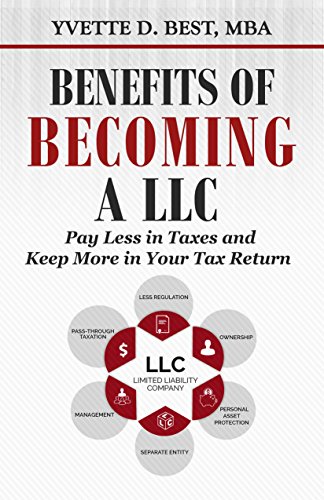Tax Benefits of LLC: Maximizing Your Business’s Financial Advantage
In the realm of business entities, the Limited Liability Company (LLC) has emerged as a popular choice for entrepreneurs seeking a flexible yet protective structure. Not only does an LLC offer liability protection, but it also presents numerous tax benefits that can significantly impact your business’s financial health. In this comprehensive guide, we will delve into the tax advantages of an LLC and explore how you can leverage them to optimize your tax strategy.
Pass-Through Taxation: The Cornerstone of LLC Tax Benefits
One of the key advantages of forming an LLC is its unique tax treatment known as pass-through taxation. Unlike traditional corporations, where profits are subject to double taxation, an LLC allows income to “pass through” the business and be taxed only at the individual owner’s level. This means that the LLC itself does not pay federal income taxes, avoiding the burden of corporate tax rates.
By adopting pass-through taxation, LLCs can avoid the double taxation trap and enjoy significant tax savings. As an LLC owner, you report your share of the business’s profits and losses on your personal tax return, which is typically filed using IRS Form 1040. This simplicity not only reduces administrative complexities but also allows for greater flexibility in managing your tax liabilities.
Self-Employment Tax Savings for LLC Members
Another notable tax benefit of an LLC is the potential for self-employment tax savings. In a traditional employment setup, individuals are subject to both the employee and employer portions of Social Security and Medicare taxes, collectively known as self-employment taxes. However, as an LLC member, you may be able to reduce your self-employment tax burden.
By default, LLC members are considered self-employed, and their share of the LLC’s profits is subject to self-employment tax. However, if you meet certain IRS criteria, you may be eligible to be treated as a “limited partner” for tax purposes. Limited partners are not subject to self-employment tax on their share of profits, potentially resulting in substantial tax savings.
Flexibility in Tax Classification: Choose What Works Best
Unlike other business entities, an LLC offers unparalleled flexibility when it comes to tax classification. By default, an LLC with a single member is treated as a “disregarded entity” for tax purposes, meaning it is taxed as a sole proprietorship. Similarly, an LLC with multiple members is taxed as a partnership by default.
However, LLCs have the option to choose a different tax classification that aligns with their business goals. For instance, an LLC can elect to be taxed as an S Corporation, which can result in potential tax savings by reducing self-employment taxes. Alternatively, if an LLC meets certain criteria, it can choose to be taxed as a C Corporation, which may be advantageous in specific situations.
Deductible Business Expenses: Maximizing Your Tax Savings
As an LLC owner, you can take advantage of a wide range of deductible business expenses to reduce your taxable income. By properly documenting and categorizing your business expenses, you can maximize your tax savings and optimize your LLC’s financial performance.
Common deductible expenses for LLCs include:
Office rent or mortgage payments
Utilities and internet expenses
Business insurance premiums
Professional services (accounting, legal, etc.)
Marketing and advertising costs
Travel and transportation expenses
Employee wages and benefits
By diligently tracking and documenting these expenses, you can reduce your taxable income, ultimately lowering your overall tax liability.
Enhanced Retirement Planning Options for LLC Owners
Retirement planning is a crucial aspect of any business owner’s financial strategy. LLC owners have several retirement planning options that can provide significant tax advantages while helping secure their financial future.
One popular retirement planning option for LLC owners is the Simplified Employee Pension (SEP) IRA. With a SEP IRA, LLC owners can contribute a percentage of their self-employment income into a tax-advantaged retirement account. These contributions are tax-deductible, reducing the LLC owner’s taxable income while simultaneously building a retirement nest egg.
Additionally, LLC owners can explore other retirement plans such as the Solo 401(k) or the SIMPLE IRA, each offering its own set of tax benefits and contribution limits. By incorporating retirement planning into your overall tax strategy, you can simultaneously save for the future and optimize your tax position.

In summary, forming an LLC can unlock a myriad of tax benefits that can significantly impact your business’s financial success. From pass-through taxation and self-employment tax savings to flexible tax classification and deductible business expenses, LLCs offer a wealth of opportunities for tax optimization. By understanding and leveraging these tax advantages, you can strategically position your LLC for long-term growth and financial advantage.
Frequently Asked Questions about Tax Benefits of LLC
1. What are the tax benefits of forming an LLC?
Forming an LLC can provide tax advantages such as pass-through taxation, self-employment tax savings, and the ability to deduct business expenses.
2. How does pass-through taxation work for LLCs?
LLCs are not subject to double taxation like corporations. Instead, the profits and losses of the LLC “pass through” to the owners’ personal tax returns, where they are taxed at the individual income tax rates.
3. Can an LLC save me money on self-employment taxes?
Yes, if you are a single-member LLC or a multi-member LLC treated as a partnership, you may be able to avoid paying the additional 15.3% self-employment tax on your LLC’s profits. However, it’s important to consult with a tax professional for specific guidance.
4. Are there any limitations on deducting business expenses as an LLC?
While LLCs can generally deduct ordinary and necessary business expenses, there may be certain limitations or exclusions depending on the nature of the expenses. It’s advisable to consult with a tax advisor to ensure proper deductions.
5. Can an LLC help reduce my personal tax liability?
An LLC can potentially help reduce personal tax liability by allowing for various deductions, credits, and other tax planning strategies. However, individual circumstances can vary, so it’s recommended to seek professional advice.
6. Do LLC owners pay both income tax and self-employment tax?
LLC owners may be subject to both income tax and self-employment tax, depending on factors such as their role in the LLC and the nature of their income. Consulting with a tax professional is crucial to understand your specific tax obligations.
7. Are there any disadvantages to forming an LLC for tax purposes?
While there are numerous tax benefits, some potential disadvantages of forming an LLC include the need to pay self-employment taxes, potential complexity in tax filing, and state-specific tax regulations. It’s essential to evaluate these factors before deciding on LLC formation.
8. Can an LLC choose how it wants to be taxed?
Yes, an LLC can elect how it wants to be taxed. By default, single-member LLCs are taxed as sole proprietorships, while multi-member LLCs are taxed as partnerships. However, LLCs can also choose to be taxed as corporations or S corporations by filing the appropriate forms with the IRS.
9. Are there any tax benefits specific to LLCs in certain industries?
Some industries may have specific tax benefits for LLCs, such as the ability to claim certain deductions or credits. It’s advisable to consult with a tax professional familiar with your industry to understand any industry-specific tax advantages.
10. Can I convert my existing business into an LLC for tax benefits?
Yes, it is possible to convert an existing business into an LLC for tax benefits. However, the process and implications can vary depending on the business structure and state laws. Seeking guidance from an attorney or tax advisor is recommended.




